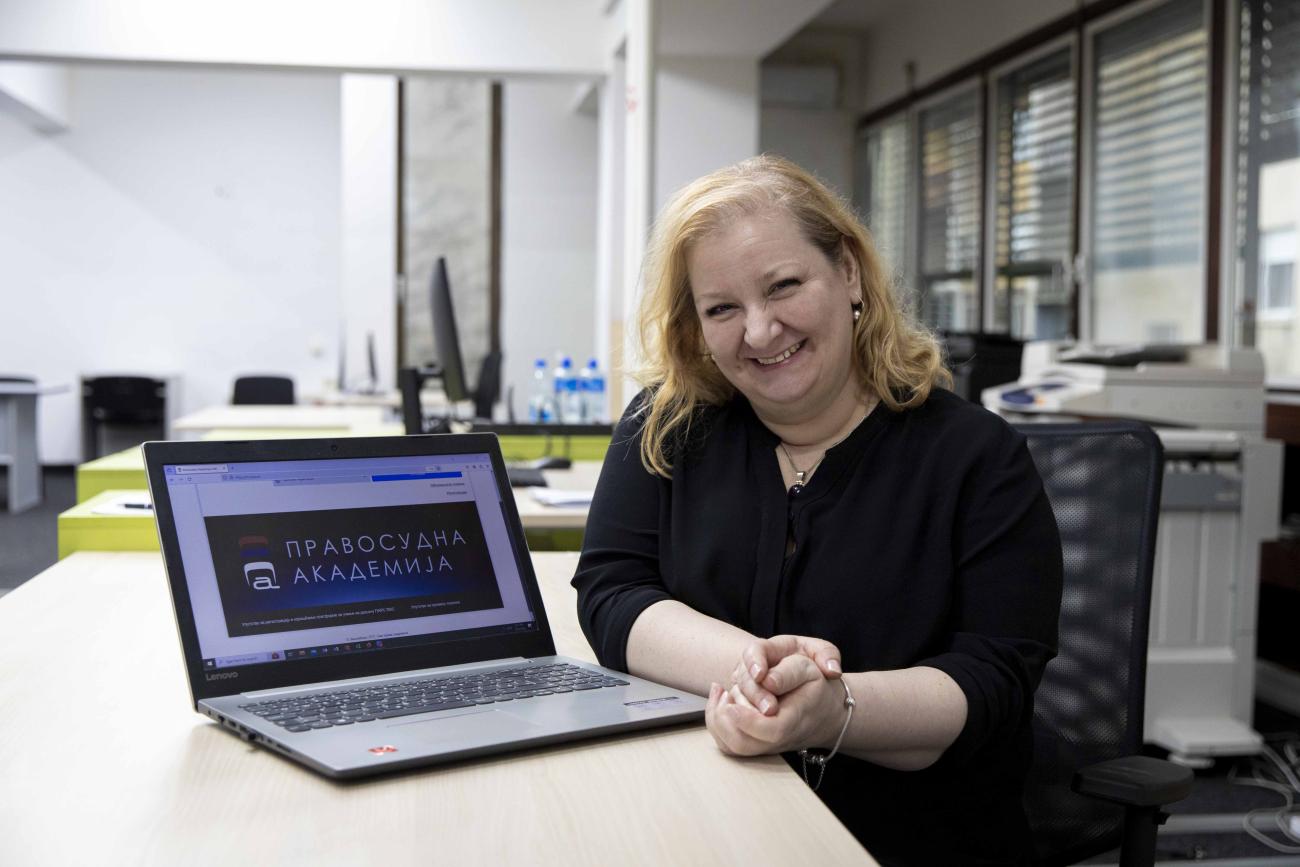A Digital Pioneer in the Fight against Domestic Violence

A Digital Pioneer in the Fight against Domestic Violence
“Two years ago, I was given a seemingly not so complicated task – to identify a suitable platform for posting online training courses on domestic violence protection and prevention, intended primarily for judges and prosecutors, judicial and prosecutorial assistants and Judicial Academy's initial training attendees”, Biljana Stepanović, Head of the Division for the Documentation Centre at the Judicial Academy, begins her story. What she did not know at the time was that she was about to launch this institution's digital transformation.
As mathematics graduate specialising in computer science, holding a master’s degree in economics and having over 20 years of professional experience, she was eager to take up the challenge of ensuring modernised, efficient and easily accessible training courses for prosecutors, judges, as well as staff of other institutions mandated to enforce the Law on the Prevention of Domestic Violence.
The task was to make training courses on recognising different forms of domestic violence, assessing the risk of violence escalation and recurrence, proving the crime of domestic violence, including cases of firearms misuse as a high-risk factor, as well as on commitments under the Council of Europe Convention on Preventing and Combating Violence against Women and Domestic Violence (Istanbul Convention), available on an online platform. Under the Law on the Prevention of Domestic Violence, case-handling prosecutors and judges are required to complete this training course at the Judicial Academy.
“I believed that digitizing a training programme like this one, which was traditionally classroom-based, would bring enormous benefits. My goal was to devise a solution that people will be happy to use and that will benefit them in the long run. This gave me the idea to launch our own online self-study platform, which would become the cornerstone of our new information system”, notes Biljana.
An advantage of such a system is that trainees can take the prepared courses on their own, at their convenience, download different learning materials, and further broaden and enhance their knowledge using linked contents from the Academy’s other databases. At the same time, the Academy gets a fully connected database system and the possibility of designing new, tailored courses and contents through analysing trainee behaviour data.
As the project leader, Biljana faced numerous challenges in the development of the new platform.
“Beside the unknowns, there was the system-wide practice based on printed documents and in-person classroom instruction, as well as the possible ‘silent resistance’ to change. I was lucky to be supported both by the Judicial Academy management and by my own family, who understood why succeeding in this endeavour mattered to me”, says Biljana.
Two years later, after putting tremendous effort into the new information system code, the Judicial Academy had its own, unique distance learning platform for the first time. Now judges, public prosecutors and deputy public prosecutors, judicial and prosecutorial assistants, Judicial Academy’s initial training attendees, as well as staff in the police, health care and centres for social work, can pursue professional development at their convenience and revisit specific modules if they need a refresher. In addition, digitisation has led to training cost savings, as in-person training is no longer necessary, which is especially important for professionals in smaller communities.

“In my view, the greatest benefit is that now every participant in the process gains comprehensive knowledge. The training is detailed – it consists of seven modules, including a case study, and is tailored to each participant in the process, from centres for social work, to police officers, prosecutors, attorneys, and judges. Thus, all of them become aware not only of their own roles, but also of the roles of other authorities acting pursuant to the Law on the Prevention of Domestic Violence. This raises the awareness that each stakeholder is important in the process, they all have their tasks, and it is only by doing their part of the work as best they can that they can ensure timely identification, detection and prevention of violence against women”, notes Biljana.
Training courses available on the platform include challenges in enforcing the Law in domestic violence cases based on practical examples, which is crucial for trainees since it takes the training to the next level – practical application of the knowledge.
Furthermore, the platform includes a register searchable by trainees and by trainers, which is a preparatory step for establishing links to the databases kept by the High Judicial Council and the High Prosecutorial Council. This will ensure that the data on training courses attended by judges, prosecutors and staff at courts and prosecutors’ offices are automatically entered in their personal files – a feature important for judicial professionals, as training attendance is taken into consideration in career advancement.
“Now we can follow the uptake of different training courses, the time spent on each module, whether they are revisited, the times when they are accessed. All this information is essential for future training improvement and individualised approach, which is a crucial success factor for continuous professional development”, stresses Biljana.
The advantages of online learning are illustrated by the fact that, in only three months, more than 2700 users have registered on the platform, many of whom have accessed not only the training course on domestic violence protection and prevention, but also a wide range of other contents posted on the platform.
The online learning platform and modules for the Judicial Academy were developed under the projects “Integrated Response to Violence against Women and Girls in Serbia,” a joint UN Serbia initiative implemented by UNDP, UNFPA, UN Women, and UNICEF, and “Reduce Risk, Increase Safety – Towards Ending SALW Misuse in Domestic Violence Context.” This specific activity was supported by the UNDP.

